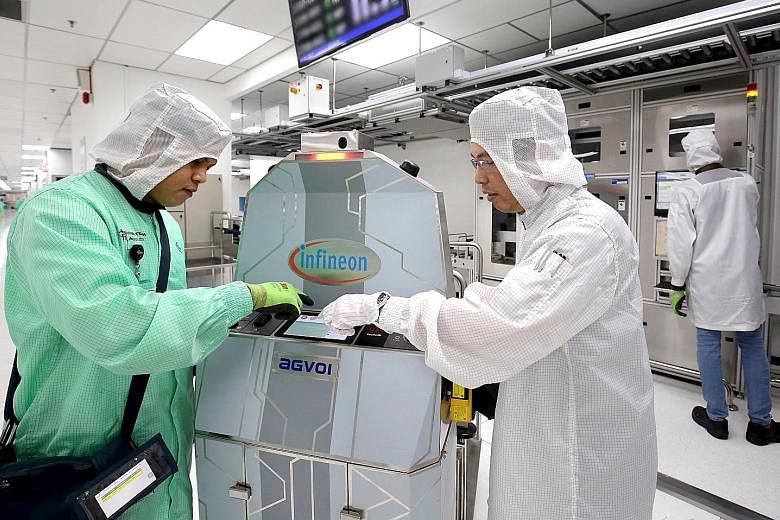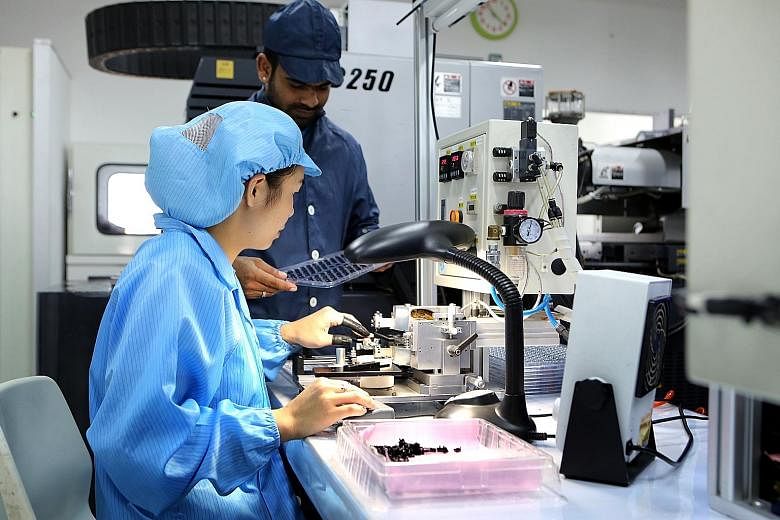Mr James Khoo has had his work cut out for him lately.
The hiring executive at Ultra Clean Asia Pacific is rushing to fill about 30 positions, mostly related to assembling machine parts or troubleshooting systems.
"Currently, we're expanding. We have a lot of prospects coming up, and we need people who are qualified to take up the roles, especially technicians," said Mr Khoo.
His company - a unit of global semiconductor, medical technology and industrial equipment multinational Ultra Clean Holdings - is among those that have benefited from a turnaround in the factory sector this year.
Manufacturing, which makes up one-fifth of the economy, is being lifted by strong global demand for semiconductors and related equipment. The sector grew at a robust 8.1 per cent in the second quarter from a year earlier, following an 8.5 per cent expansion in the first quarter.
Yet, despite this pickup, factories have not been employing more workers. In fact, employment in manufacturing fell by 2,500 jobs in the April to June period - the 11th consecutive quarter of decline.
The manufacturing sector employed 498,400 people last year - almost evenly split between local and foreign workers - compared with 540,300 in 2013.
The net jobs loss has led to a flood of applicants when vacancies crop up. In late July, a walk-in hiring exercise at consumer giant 3M's Tuas manufacturing plant drew more than 1,000 job seekers for several dozen production positions.
Across the sector, entry-level and digitally skilled workers are in high demand, even as traditional mid-level roles get squeezed.
UNEVEN GROWTH
Some industry segments are faring better than others, reflecting uneven growth across different parts of the manufacturing sector.
While electronics-makers have seen business boom, marine and offshore engineering has been hit hard by low oil prices, and companies are still reeling from the impact.
Tens of thousands of jobs were axed as the sector suffered a string of high-profile bond defaults.
Diploma holder Henry Lee, 52, was laid off in July from his role as a technician, after having to leave another company a year ago when it shuttered. "This is my fourth job fair... because the petrochemical line is on a downsizing (trend)," he said at a job fair organised by NTUC's Employment and Employability Institute last month.
He used to draw a monthly salary of more than $3,000, he said, but found that companies now tend to be on the lookout either for entry-level workers or degree holders.
Noting that many openings are in precision engineering and the semiconductor industry, he added: "Because I've been working in the petrochemical industry for the past 20 years, (employers) are unable to match the pay."
Job prospects also vary depending on whether workers are professionals, managers, executives and technicians (PMETs) or rank and file. The share of local PMET jobs in manufacturing has risen over the years, hitting 62.2 per cent last year.
"Many of the PMET (job losses) are due to the restructuring of the economy," said Mr Cheng Hing Nan, a senior career coach at government agency Workforce Singapore's Careers Connect centre. "For PMETs, if they do a career switch, they would see a reduction in their pay."
Rank-and-file workers remain sought after, he added, as their skills are more easily transferable.
Institute of Technical Education student Yu Chun Hsien, 23, walked in on a whim to the same job fair as Mr Lee and promptly landed a job as a wafer fabrication technician, with a basic pay of $1,200 to $1,500 a month. Mr Yu, who is graduating with a Nitec in electronics, computer networking and communications in December, said: "I'm okay with any job that's available."
FUNDAMENTAL SHIFTS
But the changes in manufacturing employment go beyond ups and downs in the business cycle.
The numbers also reflect seismic shifts in the way factories are structured, experts said, as technology changes the way work is done. Manufacturers have invested in automation and new technologies, so fewer workers are needed in factories.
Mr Lim Kok Kiang, assistant managing director at the Economic Development Board (EDB), told The Straits Times: "The manufacturing sector will be facing huge changes ahead, as new technologies such as 3D printing and robotics are fusing with digital technology such as artificial intelligence to give rise to advanced manufacturing."
OCBC Bank head of treasury research and strategy Selena Ling agreed: "There are some structural shifts... that fundamentally change the role that physical manpower plays in the industry. A pharmaceutical plant, for instance, may hire very few workers, but very highly skilled ones." Conversely, she said, lower-end manufacturing activities may opt to leave the country.
Economist Tan Khay Boon, a senior lecturer at SIM Global Education, said: "The decline in job creation is partially due to weaker demand and partially due to automation replacing the manpower."
More than 70 per cent of manufacturing jobs shed in the past three years were held by foreign work permit holders, government statistics show. That partly reflects initiatives such as the Lean Enterprise Development scheme to get small and medium-sized enterprises (SMEs) to raise productivity and focus on offering Singaporeans better jobs.
NEW ROLES
As digitalisation overhauls the industry, new and higher-value roles involve working with more complex technology.
Mr David Ong, senior director of communications at semiconductor maker Infineon Technologies Asia Pacific, said: "Smart manufacturing initiatives like automation have direct impact on job scopes of engineers, technicians and operators. The introduction of new workflow, technology and robotics, for example, requires new skill sets in troubleshooting and operating a variety of man-machine interfaces."
For example, he said, existing workers will have to learn how to operate and maintain advanced robotics-integrated systems.
At Makino Asia, which has added about 25 employees in the past four months, chief executive Neo Eng Chong said: "We're also trying to put in place, connect up the (automated) systems - but we face another problem. That is the hiring of scientists."
The machine-maker is looking for traditional engineers and technicians to meet a rise in business volume, but also needs skilled workers who can handle digitalisation's information flow as data scientists and analysts. "It's not easy to get talent," said Mr Neo.
Mr Chee Teck Lee, founder and chief executive of home-grown optics manufacturer Moveon Technologies, also relies heavily on advanced manufacturing machines to produce ever-smaller lenses and devices. About half of Moveon's 100 or so workers in Singapore work directly on the floor.
Such equipment is "not equipment where you press a button and it runs. You need to do programming, you need to do materials evaluation", said Mr Chee. "So what we are in need of right now are people who have very multidisciplinary skill sets - for example, optics engineers with materials background."
SLOW MARCH OF PROGRESS
As the economy retools, a slew of workforce initiatives is under way, such as Professional Conversion Programmes for PMETs and Place-and-Train schemes for others. EDB's Mr Lim also noted that ongoing Industry Transformation Maps include Skills Framework components.
Companies will realise that they have no choice but to keep up with the high-tech trend, said Singapore Manufacturing Federation secretary-general Lam Joon Khoi. "The reality is that there has been a global shift towards the digitalisation of manufacturing and businesses must transform or be left behind."
Despite growing pains, he is optimistic that manufacturing workers will live to see another day, in the new jobs created to fill technological roles. "The encouragement by the Government for SMEs to go global and grow their market abroad will also create new jobs to support such ventures."




